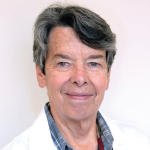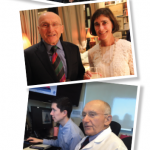“There are a lot of patients who are uninsured or underinsured and as people age, their healthcare needs typically increase,” Dr. Green says.
Using Telemedicine to Evaluate Rheumatology Patients
Gerson Bernhard, MD, FACP, MACR, a clinical professor of Medicine at the University of California
San Francisco (UCSF), is semi-retired and has volunteered with MAVEN for the last year and a half. He was one of three rheumatologists who worked on the Ampla Health pilot project.
“Each of us would spend an afternoon seeing patients through telehealth consults,” says Dr. Bernhard. “A nurse, physician’s assistant or physician would sit with patients in an exam room at the community health center, while my rheumatology colleagues or I would talk with the patient and assess their rheumatic condition via camera.”

Dr. Bernhard
Dr. Bernhard says patient diagnoses in the pilot project ran the gamut and included arthritis, fibromyalgia, psoriatic arthritis and gout.
“For patients who require further evaluation, I arrange to have them visit our rheumatology clinic in San Francisco,” Dr. Bernhard says. “Once their condition is stable, they can continue to receive follow-up care at their local community health clinic.”
In addition to doing telehealth consults with patients, Dr. Bernhard says MAVEN volunteers also work to educate primary care physicians, nurse practitioners and physician assistants who serve as the first line of evaluation for patients.
“I think the education component is one of the most important things we can share with our colleagues in community health centers,” Dr. Bernhard says. “It assists them in deciding which patients need to receive more specialty management care.”

Dr. Upchurch
Katherine Upchurch, MD, a rheumatologist at UMass Memorial Medical Center in Worcester, Mass., was one of MAVEN’s first volunteers on the East Coast. Currently on medical leave from her practice, she volunteers with MAVEN five hours each month.
“I’ve done one-on-one specialty telehealth consults with patients and their nurse practitioners in community health clinics,” says Dr. Upchurch. “Access is definitely a barrier for many of the patients. It’s hard to see a specialist when they live in towns outside big cities, have mobility issues, no transportation and often don’t speak English fluently.”
Dr. Upchurch says these obstacles can result in insufficient management of a patient’s rheumatic disease, whereas telehealth has been shown to improve patient outcomes.
Research published in the April 2016 issue of BMC Musculoskeletal Disorders compared patients receiving intensive treatment for rheumatoid arthritis via telemonitoring with patients receiving conventional medical care. The results showed the telemedicine group demonstrated better outcomes in several areas including a higher percentage achieving remission at the one-year mark, a shorter median time to remission (20 weeks as opposed to 36), greater improvements in functional impairment, radiological damage progression and comprehensive disease control.4



